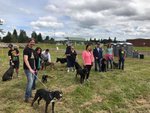


North Clark County has a solution for so-called problem dogs, as one trainer’s operation looks at ways to teach owners “how to let their dogs be dogs” to get the most out of the dog/owner relationship.
Enzo’s Acres has been in North County since 2015, offering services from training, boarding, transport and even adoption for dogs. The operation’s main trainer, Dawn Rennie, along with her husband, Tom, moved out from living "in the city" in Oregon in order to find a location more apt for the work, and Clark County was the place.
As to the titular Enzo, the training operation is named after a family pet that left a lasting impression on the Rennies.
According to Enzo’s Acres page on its namesake, Enzo, a white boxer, was picked up from a breeder in December, 2006. He was essentially “saved” by Rennie’s acquisition, as the breeder had to be talked into not simply euthanizing the animal with a less-than-ideal coloration for show.
Luckily for Enzo, there was “something extraordinary about him,” that Rennie and those who encountered him could see. The dog spent five-and-a-half years of life with the Rennies before succumbing to cancer in 2012.
Now Enzo’s legacy lives on through the training operation, which apart from a variety of different behavioral training programs, also runs a nonprofit dog rescue of all breeds.
Chief to the training philosophy, Enzo’s Acres focuses on letting dogs be dogs. Rennie said one of the biggest issues can come from how people interact with their animals, unintentionally setting the groundwork for bad habits.
“I think the number-one misconception is that humans ‘humanize’ their dog,” Rennie said.
She likened the first arrival of a new animal into a household as often treated the same way as a newborn baby inasmuch as the animal is doted on without much asked in return. This all give, no take can lead to issues down the line, Rennie said.
“Dogs need structure, rules, boundaries; you need to teach a dog first and foremost what it is you expect of them,” Rennie said.
Doting on a dog can set up the expectation early on what they can and cannot do to get what they want. She also said the public tends to view training as cut-and-dry, with the old adage of old dogs being unable to learn new tricks reinforcing the notion. Rennie said dogs can go through stages of changes through their life, and nothing is as static as the cliché tends to suggest.
“Things change for them like they do for us; they are ever-evolving, and I think people forget that with dogs,” Rennie said.
Rennie has been training dogs for about 26 years, beginning first on a whim to have her dog trained in search-and-rescue, even though the skill was never put to use in a formal setting. The decision to do training full-time happened “organically,” she said, explaining it had always been a hobby training her own and the animals of friends and family.
Since the relocation north of the Columbia the business has grown, seeing more than 2,000 clients annually; so much so that a location in downtown Battle Ground opened up May of this year.
In regard to training aspects, Rennie said that having a well-established “pack” of dogs makes for better socialization. She also said that a strong connection with the owner was integral in making sure the dog is allowed to be a dog.
“We really feel that the owners are the key to the success of the dog,” Rennie said.
Being able to connect between owner and trainer is also important for a successful outcome, she said.
“Look for someone you want to create a relationship with, because that’s what dog training is,” Rennie said. “I’m helping you teach your dog for a lifetime, it’s not just a quick fix.”